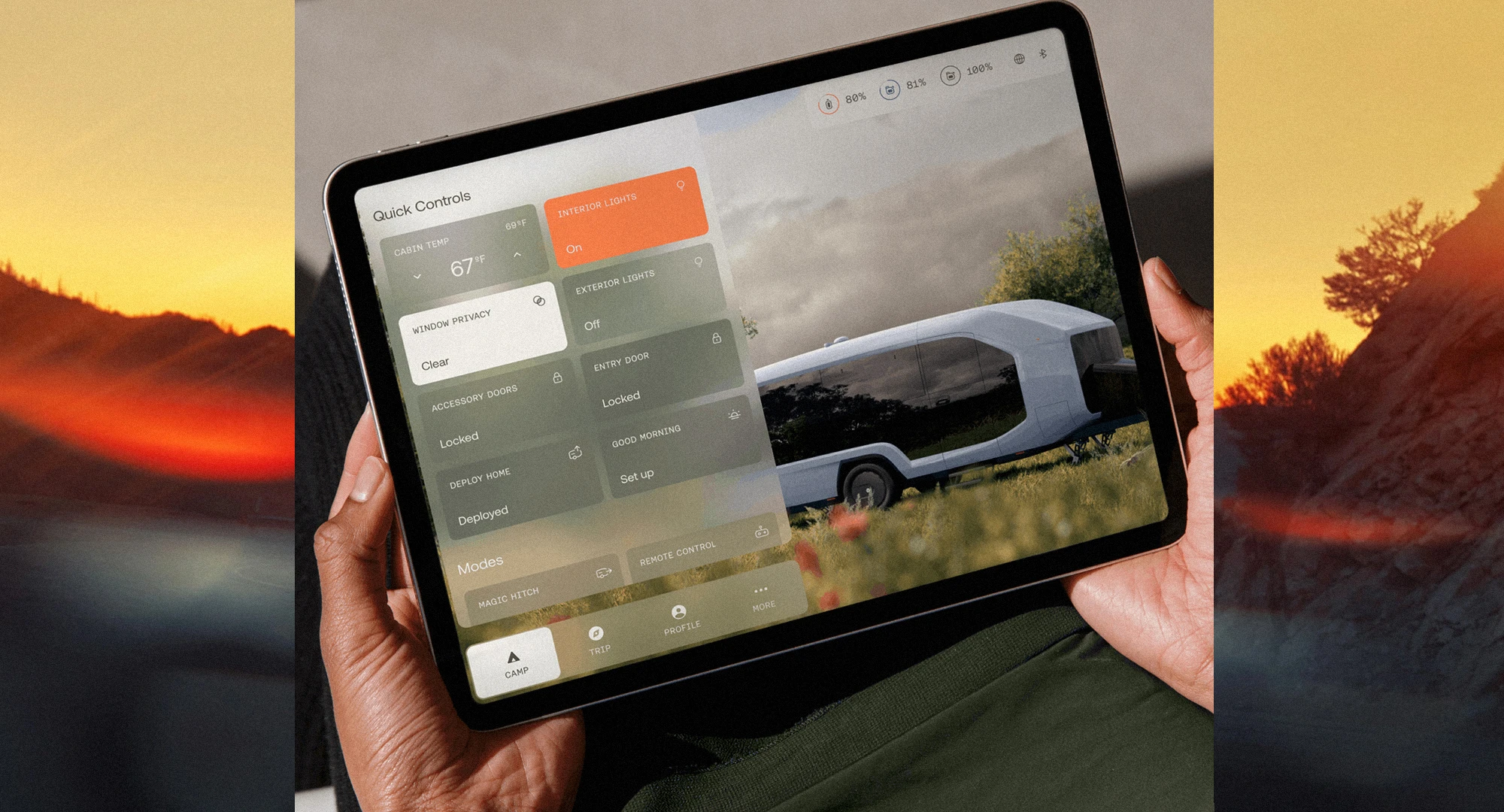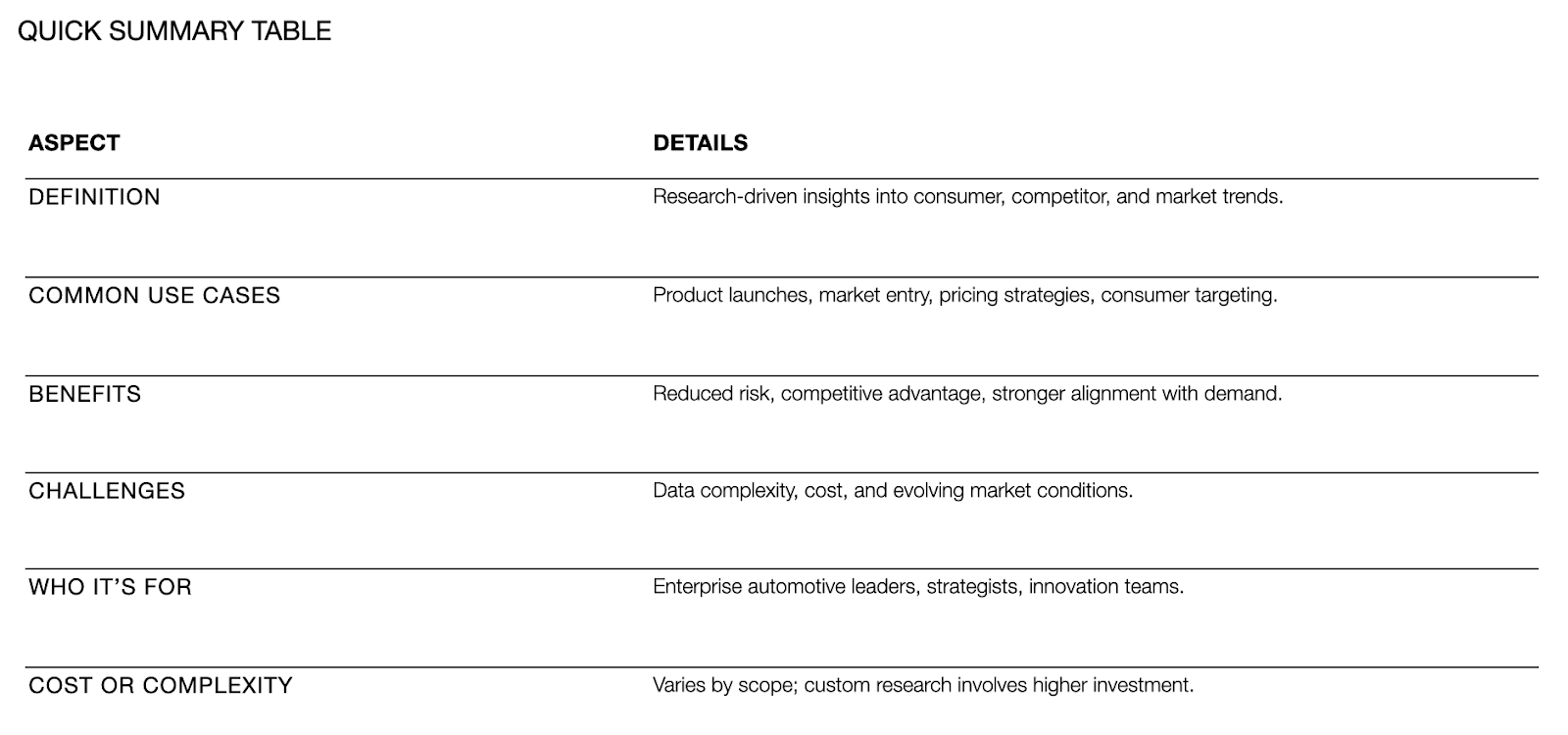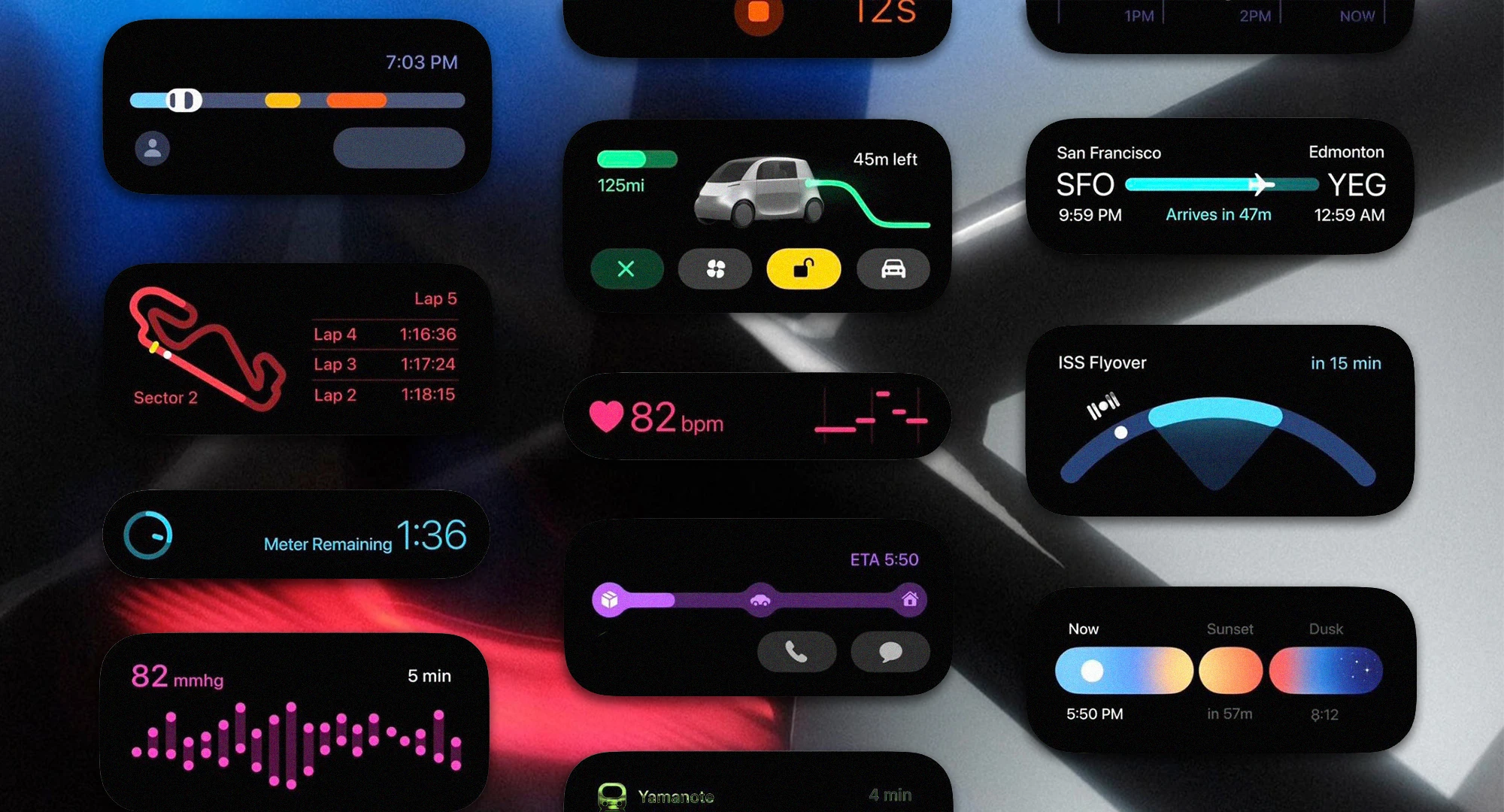
Automotive Market Research FAQs | Automotive Industry Insights
The automotive industry is navigating one of the most transformative eras in its history. From electrification to mobility services and connected car technologies, leaders face pressure to make confident decisions in uncertain markets. Many brands struggle to align investments with consumer demand, new regulations, and competitive disruption.
This article demystifies automotive market research and explains how it supports enterprise decision-making. Executives will gain clarity on its importance, the role of automotive market research companies, and how custom automotive market research enables brands to stay ahead. Directors, VPs, and Heads of enterprise automotive organizations will leave with actionable insights and a clearer sense of when and how to leverage research partners for growth.
Market Context: Disruption & Opportunity
The global automotive industry is shifting faster than legacy business models can adapt. Electrification mandates, shifting mobility patterns, and digital-first buyers are reshaping expectations. At the same time, competition from new entrants and global supply chain disruptions add complexity to planning.
Automotive industry market research has become an essential tool to understand shifting consumer preferences, evaluate new technologies, and benchmark competitors. Without robust data, decisions about pricing, product launches, and brand positioning risk being misaligned with real market conditions. This creates an opportunity for enterprise leaders to gain an edge by working with automotive market research firms that combine data-driven insights with strategic consulting expertise.
FAQs Snapshot

What is automotive market research?
Automotive market research is the process of gathering and analyzing data about the automotive industry, including consumer behavior, competitor strategies, and emerging technology adoption. It enables brands to identify trends, anticipate risks, and validate opportunities. For enterprise organizations, market research for automotive industry applications informs product design, digital initiatives, and long-term strategy.
Why is automotive industry market research important?
Automotive industry market research helps companies reduce uncertainty and make confident investments. From electric vehicle adoption rates to supply chain dependencies, research highlights both risks and opportunities. Leaders use insights to shape brand strategy, optimize customer experiences, and ensure that strategic bets align with market realities.
How do automotive market research companies work with enterprises?
Automotive market research companies specialize in collecting data, conducting surveys, and analyzing trends. They often deliver an automotive industry market research report that outlines opportunities, challenges, and competitor benchmarks. For enterprise automotive brands, these firms serve as external partners, offering both the technical research and strategic interpretation needed to act on the findings.
What is the difference between general and custom automotive market research?
General market research automotive reports provide a broad industry view, but they may not answer a company’s specific questions. Custom automotive market research, however, tailors methodologies to a brand’s unique challenges—such as regional demand for electric SUVs or competitive pricing strategies in luxury segments. This customization ensures insights are directly actionable.
What does a market research report automotive industry include?
A market research report automotive industry typically covers market size, growth projections, consumer demographics, purchase drivers, competitor analysis, and regulatory influences. Automotive industry market research reports may also feature scenario planning to prepare brands for multiple possible futures. These deliverables help executives justify strategic decisions and secure stakeholder alignment.
When should a brand work with automotive market research firms?
Enterprise brands often turn to automotive market research firms when planning a new product launch, expanding into a new market, or evaluating technology investments. Market research for automotive industry leaders is especially valuable during periods of disruption, where traditional assumptions may no longer apply. It is equally useful for optimizing ongoing customer engagement strategies.
Benefits of Automotive Market Research
Automotive market research delivers clarity in an industry defined by complexity. By leveraging structured insights, brands gain the ability to anticipate shifts, minimize risks, and capture new growth opportunities.
Benefits include improved product development, stronger customer targeting, and sharper competitive positioning. Executives can use automotive industry market research reports to validate investment strategies, align global teams, and inform long-term innovation pipelines. For companies that leverage custom automotive market research, benefits extend to building differentiated strategies that reflect unique brand goals and regional market dynamics. Ultimately, working with automotive market research firms provides both data and confidence for better decision-making.

Let’s kickstart the conversation and design stuff people will love.

Deep-Dive Sections

What It Is & Why It Matters
Automotive market research is more than data collection—it is a strategic capability that empowers leaders to make informed choices. For the automotive industry, where shifts in technology and policy happen rapidly, relying on outdated assumptions can be costly. By using automotive industry market research, brands gain real-time visibility into what customers want and where the market is heading. This level of insight helps large enterprises stay ahead of agile competitors while ensuring resources are invested in areas with the highest return.
How It Works
The process of market research automotive projects typically involves multiple methods, including consumer surveys, focus groups, industry benchmarking, and advanced analytics. Automotive market research companies then synthesize this data into clear insights, often through an automotive industry market research report. These reports identify patterns, forecast trends, and highlight risks. Custom automotive market research may go further, applying industry-specific modeling or scenario analysis tailored to a brand’s needs. The combination of quantitative and qualitative methods ensures leaders can make well-rounded decisions.
When to Use It (and When Not To)
Market research for automotive industry decision-makers is most effective when entering new markets, launching innovative products, or reassessing strategy amid disruption. For example, before investing in EV infrastructure or mobility services, executives can rely on market research to evaluate feasibility. However, not every question requires custom research. When a brand seeks general industry awareness, publicly available reports may suffice. Knowing when to pursue tailored insights versus broad overviews helps balance cost with impact.
Tools or Platforms Involved
Automotive market research firms leverage advanced tools to collect and analyze data, including AI-powered analytics platforms, survey distribution systems, and industry databases. Increasingly, digital tools allow for faster turnaround times and deeper segmentation. Custom automotive market research may integrate proprietary client data with third-party research, creating a holistic view that bridges operational realities with external market forces.
Cost Considerations
The cost of automotive market research depends on scope and depth. Broad, syndicated reports are relatively affordable, but they lack specificity. Custom automotive market research requires greater investment, as it involves designing unique methodologies, conducting proprietary surveys, and running in-depth analyses. For enterprise automotive leaders, these costs are often outweighed by the value of precise insights that prevent costly missteps and support long-term growth strategies.
Integration or Setup Requirements
For research to deliver value, findings must be integrated into enterprise workflows. This means aligning insights from automotive industry market research reports with business planning, product development, and customer engagement strategies. Many automotive market research companies provide not only the data but also consulting support to ensure insights drive action. Successful integration often requires cross-functional collaboration between strategy, marketing, and operations teams.
Scalability & Flexibility
Automotive market research solutions are designed to scale with enterprise needs. Brands can begin with a focused study, such as evaluating consumer demand in a single region, and expand to global research over time. Custom automotive market research provides flexibility by adapting methodologies to evolving objectives, ensuring insights remain relevant even as business priorities shift. This scalability makes research a continuous advantage rather than a one-time activity.
Alternatives or Comparisons
Brands may consider alternatives such as relying solely on internal analytics or public reports. While these options can provide baseline understanding, they rarely match the depth of insights delivered by specialized automotive market research firms. Internal teams may face resource or expertise gaps, while syndicated reports lack customization. Partnering with experienced research providers ensures a blend of comprehensive data and strategic perspective.
Trends
Key trends shaping automotive market research include greater reliance on predictive analytics, integration of mobility and sustainability insights, and growing demand for consumer-centric data. The automotive industry market research report of the future will likely include scenario planning around autonomous vehicles, connected ecosystems, and shifting ownership models. Staying informed on these trends helps executives anticipate change rather than react to it.
Pros and Cons
Pros of automotive market research include reduced strategic risk, improved product-market fit, and sharper brand positioning. Custom automotive market research ensures enterprise-specific insights that drive meaningful decisions. Cons include cost, time requirements, and potential data overload if not carefully managed. However, with the right automotive market research firms, these challenges can be mitigated through structured delivery and actionable recommendations.
How G&Co. Can Help

At G&Co., we specialize in guiding enterprise automotive brands through complex strategic decisions. Our experience includes delivering custom automotive market research that translates into measurable impact. We support organizations with both syndicated insights and bespoke research projects tailored to their unique needs.
Our consulting expertise ensures research is not only accurate but actionable. By integrating findings into broader strategies—whether digital transformation, customer journey optimization, or market entry planning—we help brands convert research into results. Talk to us to clarify your strategy and move forward with confidence.
Conclusion & Next Steps
Automotive market research has become a cornerstone of strategic decision-making in an industry defined by rapid change. From evaluating new technologies to understanding shifting customer behaviors, research provides clarity and confidence for leaders at large enterprises.
At G&Co., we’ve worked alongside clients to implement similar shifts—whether through digital strategy, customer journey redesign, or platform modernization. Our expertise enables brands to translate trend awareness into tangible market advantage. Still have questions? Reach out and let’s solve them together.






%20(1).png)




